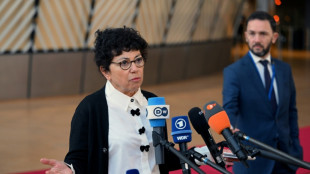Sudan defence minister says army to keep fighting after US truce proposal
Sudan's defence minister said on Tuesday that the army would press on with fighting the paramilitary Rapid Support Forces after the country's security and defence council met to discuss a US proposal for a ceasefire.
"We thank the Trump administration for its efforts and proposals to achieve peace," Hassan Kabroun said in a speech broadcast on state television, adding that "preparations for the Sudanese people's battle are ongoing."
"Our preparations for war are a legitimate national right," he said, following the council meeting in Khartoum.
No details of the US truce proposal have been made public.
The war, which has killed tens of thousands of people and displaced millions more over the past two years, has spread to new areas of Sudan in recent days, sparking fears of an even greater humanitarian catastrophe.
After mediating in other conflicts in Africa and the Middle East in recent months, the US administration under Donald Trump is now pushing for a ceasefire in Sudan.
The army-aligned authorities had rejected an earlier truce proposal under which both they and the paramilitaries they are fighting would be excluded from a transitional political process.
The latest discussions follow an escalation on the ground, with the paramilitary RSF appearing to prepare an assault on the central Kordofan region after it captured El-Fasher, the last army stronghold in the vast Darfur region.
People forced to flee El-Fasher have described to AFP intimidation and violence from the RSF.
Mohamed Abdullah, 56, told AFP he was stopped by RSF fighters while fleeing El-Fasher on Saturday, just hours before its fall.
"They demanded our phones, money, everything. They kept searching us thoroughly," he said of the RSF.
On his way to Tawila, about 70 kilometres (45 miles) to the west, he saw "a body left on the street that looked like it had been eaten by a dog".
- 'Out of control' -
Trump's envoy to Africa, Massad Boulos, held talks in Sudan's neighbour Egypt on Sunday with Cairo's Foreign Minister Badr Abdelatty and then on Monday with the Arab League.
During the discussions, Abdelatty stressed "the importance of concerted efforts to reach a humanitarian truce and a ceasefire throughout Sudan, paving the way for a comprehensive political process in the country", according to a foreign ministry statement.
According to the Arab League, Boulos met the regional body's chief Ahmed Aboul-Gheit and briefed him on recent US efforts in Sudan to "halt the war, expedite aid delivery and initiate a political process".
The so-called Quad group, comprising the United States, Egypt, the United Arab Emirates and Saudi Arabia, has been engaged in months of diplomacy aimed at securing a truce in the more than 30-month conflict in Sudan.
In September, the four powers proposed a three-month humanitarian truce, followed by a permanent ceasefire and a nine-month transition to civilian rule, but the army-aligned government immediately rejected the plan at the time.
In the aftermath of the RSF's assault on the key city of El-Fasher, reports emerged of mass killings, sexual violence, attacks on aid workers, looting and abductions during the offensive.
The International Criminal Court on Monday voiced "profound alarm and deepest concern" over the reports, adding that such acts "may constitute war crimes and crimes against humanity".
Speaking at a forum in Qatar, UN Secretary-General Antonio Guterres on Tuesday called on the warring parties to "come to the negotiating table, bring an end to this nightmare of violence -- now".
"The horrifying crisis in Sudan... is spiralling out of control," he added.
- 'Do not kill children' -
At a protest in Sudan's capital Khartoum, which is under army control, children took part in an anti-paramilitary protest on Monday.
One pupil held up a handwritten sign that read: "Do not kill children, do not kill women."
"The militia is killing the women of El-Fasher with no mercy," read another sign.
Both sides in the brutal war have been accused of committing atrocities.
The UAE is accused by the UN of supplying arms to the RSF -- allegations it has repeatedly denied.
Meanwhile, the Sudanese army has received support from Egypt, Saudi Arabia, Turkey and Iran, according to observers.
The fall of El-Fasher gave paramilitaries control over all five state capitals in Darfur, raising fears that Sudan would effectively be partitioned along an east-west axis.
The RSF now dominates Darfur and parts of the south while the army holds the north, east and central regions along the Nile and Red Sea.
O.Auer--NWT



